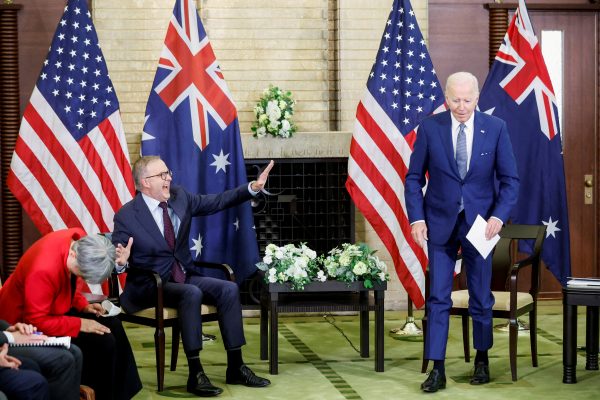Instead, Wong said that Australia’s national interest is to bring about a region where all countries benefit from a strategic equilibrium where no country dominates and no country is dominated. The Chinese economy overtook the US economy in 2016 based on purchasing power parity and has continued to grow much faster since. The idea that the United States can continue to dominate is not a sound basis for Australia’s international strategy.
Yet the United States does not seem to recognise the change in its position in Asia. The United States, with Australia’s support, says that it wants to preserve the so-called ‘rules-based order’. But that order is not the one enshrined in the UN Charter. Instead, it was established by the United States and was intended to serve US interests.
Understandably, China might want to make changes to the US rules-based order — changes that could readily be accommodated by the other nations in the Indo-Pacific. As Australia’s former ambassador to China Geoff Raby says: ‘An inclusive framework of norms, rules and habits of consultation which include China and of which it is an author, will be the best means of constraining bad behaviour [emphasis added]’.
But there is also the problem of the United States not always abiding by the present rules-based order. Instead, it is happy to ignore or bend rules when rules don’t suit it. For example, US trade sanctions on China have never been authorised by the World Trade Organization. But when China introduced trade sanctions on Australia, the United States quickly jumped in to replace the import market.
A multipolar system of international governance offers the only sustainable way forward. Australia should be working to encourage the United States to accept this new reality where it needs to share power.
The problem is that both Australia’s foreign and defence policies are based on a contradiction. Australia recognises the reality that it is living in a multipolar region, but it ties itself to an alliance partner that doesn’t.
The rest of the region doesn’t want to be forced to take sides. Like Australia, other regional members depend upon both major countries and share a common interest in establishing a set of ongoing governance arrangements that accommodates the reasonable demands of all member countries.
For Australia, this would represent a return to the former position where Australia was clear that it didn’t wish to take sides in the struggle for influence between the United States and China. But under former prime minister Scott Morrison, Australia was seen as a mouthpiece for the United States so often that it weakened its regional credibility.
As former Singaporean diplomat Kishore Mahbubani said, ASEAN countries want to have good relations with both the United States and China, and the wisest policy for Australia is to align itself with the ASEAN position where possible. That way, it could play a significant bridging role between Beijing and Washington. Plus, Australia could enhance its standing with other countries in the region if it played a leading role in persuading the United States to accept the reality of a multipolar region.
The key to Australia’s subservience to the United States, and its engagement in so many US wars, has been its perception that it depends upon the United States for defence. But Australia needs to identify its own interests clearly and all actions should be determined accordingly.
Right now, the most immediate threat to Australia’s sovereignty would be a US–China conflict over Taiwan. Should Australia not join the United States in defence of Taiwan, the issue might impact the AUKUS agreement and Australia’s purchase of nuclear submarines.
While many have argued that China has no intention of attacking Australia, intentions can change quickly. Hence defence forces are usually structured against an assessment of the capability of potential adversaries, and China’s capability is rising rapidly.
In that context, it is a legitimate response for Australia to buy nuclear submarines to strengthen its independent defence capability. But that equally requires that it controls the use of these submarines. If AUKUS is not compatible with Australia being able to determine and protect its long-run regional interests, then Australia should be prepared to let the agreement go.
Australia can and should push back when its interests and values are challenged by China. The government is right when it says that ‘we will cooperate where we can, we will disagree where we must, and we will engage in our national interest’.
But Australia needs to work with other nations on specific issues of national interest, even where they are not like-minded in terms of adherence to liberal values, including respect for human rights. Australia’s ability to push back will be enhanced if it maintains ongoing dialogue, especially with China. For example, the renewed discussion at the ministerial level has meant that issues that offend Australian values — such as unexplained detention of Australian citizens in China, human rights matters, and press and religious freedoms — can now be raised and discussed at senior government levels.
It is clearly in Australia’s interests to work with both China and the United States. That will require Australia to work closely with the many other like-minded countries in the region, and, if necessary, be less subservient to the United States.
Michael Keating is former Secretary of the Department of Prime Minister and Cabinet, the Department of Finance and the Department of Employment and Industrial Relations. He is presently a visiting fellow at The Australian National University.
A longer version of this piece was originally published here by Pearls and Irritations.

